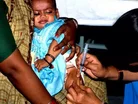UNICEF tackles pneumonia and diarrhoea to save 2m lives

The lives of two million children could be saved every year if they are vaccinated against things like pneumonia and diarrhoea.
That’s according to the United Nations Children's Fund (UNICEF), who says the illnesses are two of the biggest killers of the world’s poorest children under five.
A study carried out by UNICEF found the biggest impact of vaccinating against pneumonia and diarrhoea would be seen in south Asia and southern Africa, where approximately 90 percent of deaths resulting from the conditions occur.
It is thought the opportunity the organisation has identified would go a long way towards narrowing the child survival gap between first and third world countries.
To read the latest edition of Healthcare Global, click here
- GP surgeries to be scored out of 10 by patients
- New hope for a universal pneumococcal meningitis vaccine
- New cases of gonorrhea up by a quarter in 2011
“We know what works against pneumonia and diarrhoea – the two illnesses that hit the poorest hardest,” commented Anthony Lake, UNICEF Executive Director.
“Scaling up simple interventions could overcome two of the biggest obstacles to increasing child survival, help give every child a fair chance to grow and thrive.”
As well as increasing the availability of vaccines, very simple steps can be taken to tackle both diarrhoea and pneumonia.
These include encouraging breastfeeding and hand-washing with soap; increasing access to safe drinking water and sanitation services.
Distributing oral rehydration salts to children with diarrhoea and antibiotics to children with bacterial pneumonia would also be a huge help, UNICEF says.
It believes the potential for saving children’s lives is huge if proven, cost-effective interventions for pneumonia and diarrhoea can be scaled up to reach the most disadvantaged children.
New vaccines against the major causes of pneumonia and diarrhoea are already available, and the report found that most low-income countries have introduced the Haemophilus influenza type b (Hib) vaccine.
And while pneumococcal conjugate vaccines are also increasingly available, low-income countries urgently need to introduce them into routine immunisation programmes.
The new UNICEF report - Pneumonia and diarrhoea: Tackling the deadliest diseases for the world’s poorest children – has been issued shortly before the launch of a major global initiative on child survival in Washington, D.C. on 14-15 June convened by the Governments of the Ethiopia, India and the United States with 700 leaders and global experts from government, the private sector and civil society.
Photo copyright: WHO/P. Virot
The Healthcare Global magazine is now available on the iPad. Click here to download it.
